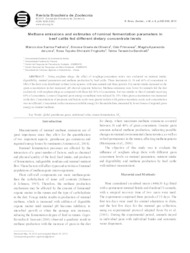Methane emissions and estimates of ruminal fermentation parameters in beef cattle fed different dietary concentrate levels.
Methane emissions and estimates of ruminal fermentation parameters in beef cattle fed different dietary concentrate levels.
Author(s): PEDREIRA, M. dos S.; OLIVEIRA, S. G. de; PRIMAVESI, O. M. A. S. P. R.; LIMA, M. A. de; FRIGHETTO, R. T. S.; BERCHIELLI, T. T.
Summary: sing sorghum silage, the effect of roughage/concentrate ratios was evaluated on nutrient intake, digestibility, ruminal parameters and methane production by beef cattle. Three treatments (0, 30 and 60% of concentrate in DM of the diet) were distributed in three Latin squares, with nine animals and three periods. Dry matter intake increased as the grain concentration in diet increased; pH showed opposite behavior. Methane emissions were lower for animals fed the diet exclusively with sorghum silage as compared with those fed 30% of concentrate, but was similar to that of animals receiving 60% of concentrate. Losses of ingested gross energy as methane were reduced by 33% when grain concentration was increased in the diet. Concentrations of propionic and butyric acids were greater in diets with grain concentrate; acetic acid concentration was not affected. Concentrate in diet increases available energy for the metabolism, measured by lower losses of ingested gross energy as ruminal methane.
Publication year: 2013
Types of publication: Journal article
Keywords: Global greenhouse gases, Nutritional value, SF6, rumen fermentation
Observation
Some of Embrapa's publications are published as ePub files. To read them, use or download one of the following free software options to your computer or mobile device. Android: Google Play Books; IOS: iBooks; Windows and Linux: Calibre.
Access other publications
Access the Agricultural Research Database (BDPA) to consult Embrapa's full library collection and records.
Visit Embrapa Bookstore to purchase books and other publications sold by Embrapa.

